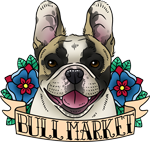CFIA Partners Canadian Breeders with USDA
This is a repost of an article I originally wrote in 2010, and it details more specifically the CFIA’s insistence that any dog imported by a ‘commercial importer’ (if you breed, show, train or handle dogs, CFIA designates you as a ‘commercial importer).
The import restrictions now being enforced by Canadian Border Services, on behalf of the Canadian Food Inspection Agency, grow increasingly disturbing the more they are examined.
It is now apparent that, under these restrictions, ANY puppy under the age of eight months which is imported into Canada from the USA for ‘commercial purposes’ must be:
sourced from dealers licensed by the United States Department of Agriculture (born in a licensed kennel).
In a nutshell, they must come from USDA Breeders. Apparently, the CFIA thinks that a USDA designation is some sort of ‘stamp of approval’ of breeding quality.
That would be funny, except it really isn’t.
USDA breeders are pretty much universally loathed by show breeders, and anyone who is breeding dogs for any other reasons than financial gain. Their requirements for housing and care are inhumane, so far as any ethical breeder is concerned.
Consider this diagram, outlining what the USDA considers to be an ‘acceptable’ cage size for dogs:
Click here, to see the rest of the illustrations, and the USDA guidelines they are based on.
This restriction might have been fine when the designation of a ‘commercial’ importer was basically anyone who was importing puppies to be re-sold – ie; pet stores who sell puppies. Now that we’re told by CFIA that “commercial” designates anyone in Canada who has ever “bred a litter, shown a dog, or trained a dog”, this USDA restriction isn’t just unpleasant, it’s un tenuous. Even if anyone of us wanted to go to the trouble and expense of importing a USDA bred dog, we likely couldn’t couldn’t do anything with it in Canada once we had.
More and more USDA breeders don’t use the American Kennel Club to register their litters – ‘alternative’ registries like ARPA and the ConKC are cheaper, ask less questions, and welcome AKC suspended breeders with open arms. In Canada, the only American bred dogs that the Canadian Kennel Club will register are AKC registered dogs.
This isn’t just a problem – it’s a big problem, because as a CKC member, we’re not permitted to breed dogs that are not CKC registered.
This brings us back again to the issue at hand, which is “Can the CFIA’s regulations contravene the requirements of the CKC, which is mandated to maintain the integrity of Pedigree dogs in Canada, via the Animal Pedigree Act?”.
Once again, I spoke to Dr. Susan Wray, CFIA’s Animal Health Import Contact. I asked her if she didn’t see the catch 22 that this requirement was putting CKC breeders in. Her quote was
“That’s not my concern. Unless the breeder is on the USDA list of licensed kennels, I do not issue the permit”.
CFIA obviously sees no difference between a hobby breeder who imports one puppy every ten years, for the benefit of their own breeding program, and someone importing trucks full of puppies to be re sold in pet stores.
I also suspect that a large part of the problem is that CFIA (which is, after all, short of Canadian Food Inspection Agency) sees dogs as just another ‘crop’ or form of livestock, to be raised under regulated ‘farm’ conditions, such as these at a “Benchmark Award Winning USDA Licensed Kennel Facility”.
I’m sure that, if you asked Dr. Susan Wray or any of her colleagues at the CFIA, these are the conditions they’d like to see imported dogs raised under – tidy, sanitary and completely cold and devoid of affection or human interaction. But, dogs aren’t livestock – and many of us are beginning to believe that even livestock being raised for the table deserver more stimulating environments than this, much less dogs being raised to play the role of family pets.
CFIA’s stance leaves those of us labeled as ‘commercial importers’ with three options:
– only ever import USDA breeder bred puppies
– only import dogs older than eight months of age
– lie, and be the ‘deceptive’ breeders that CBSA have accused us of being
The simple answer would seem to be ‘don’t bring in dogs under eight months of age’, but that’s not so easily done. First of all, most breeders are unlikely to hold on to their show prospect puppies until eight months, just to help Canadian breeders comply with this sort of draconian legislation. Secondly, while bringing in a small breed puppy older than eight months might not be that big of a deal, it is infinitely harder for breeders of large or giant breeds. Shipping an eight week old mastiff puppy is fairly uncomplicated – shipping an eight month old mastiff is something else altogether.
I’ve called the CKC, and have left a message asking for their input on this situation. Hopefully, someone within their organization will feel that this is their concern. As a CKC breeder, it certainly is mine.
Addendum: A few people have written asking me for the contact information for the CFIA, and for their import specialists. Here it is, from the Equine Canada Website. For more specialized questions about importing dogs, please contact them directly.
Animal Health Staff Veterinarian
Atlantic Area
Telephone: (506) 851-7871
Fax: (506) 851-3700
mcleanaw@inspection.gc.ca
Program Specialist— Importation
Program Network—Quebec
Telephone: (514) 283-3815 (4210)
Fax: (514) 283-6214
lajoiea@inspection.gc.ca
Program Specialist—Import
Program Network—Ontario
Telephone: (519) 826-2810
Fax: (519) 837-9771
wrays@inspection.gc.ca
Veterinary Program Specialist
Program Network—West
Telephone: (403) 292-5825
Fax: (403) 292-6629
krugerg@inspection.gc.ca



